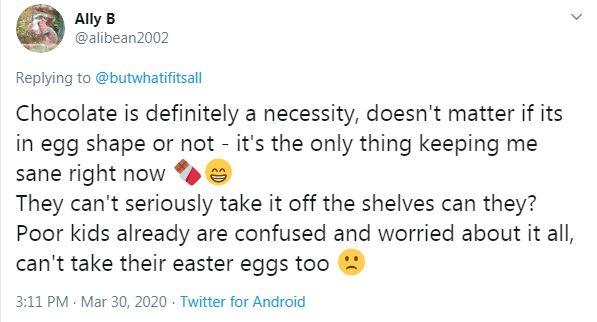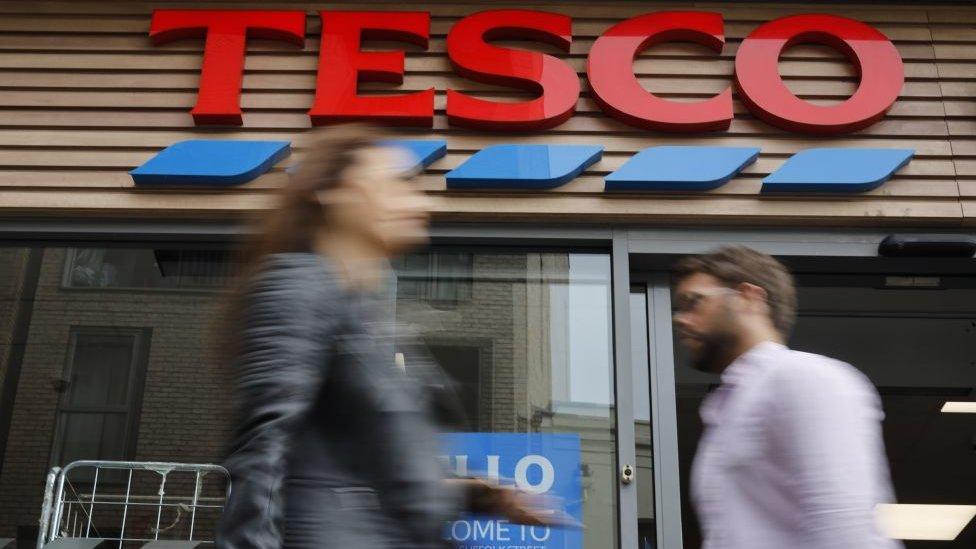Coronavirus: Easter egg crackdown over essential status 'wrong'
- Published

Convenience stores selling Easter eggs are facing interference from “heavy-handed” officials trying to restrict the range of goods they can sell under coronavirus curbs, a trade body says.
Some shops have been told by police and local councils that the chocolate eggs are considered non-essential goods.
The Association of Convenience Stores (ACS) blamed “overzealous enforcement and a misreading of the rules”.
It has told shopkeepers to carry on selling a full range of goods.
“The government have defined which stores can remain open, and that includes convenience stores, including newsagents and off-licences,” said ACS chief executive James Lowman.
“There is no government definition of which products can be sold within those stores.
“In the cases where officers have challenged retailers and shoppers in this way, it’s brought confusion, distracted retailers in the busiest weeks of their lives and increased the interactions between people at a time when the government is trying to minimise them.”
'Bonkers'
The attempt to restrict the kinds of goods sold in convenience stores drew a scathing reaction from retail analyst Richard Hyman.
"Quite frankly, it sounds bonkers," he said. "This is a time when being excessively pedantic seems rather absurd.
"It's certainly right that if restrictions are going to be applied, they should be applied to types of outlet, not types of product."
He said the current rules, which put no restrictions on the items essential retailers can sell, were common sense and pointed out that supermarkets also had Easter eggs for sale.
"Going beyond that, what difference does it make if they do sell some Easter eggs? I suppose they might argue that it's taking up space on shelves that could be used for other items," Mr Hyman said.
Some social media users shared the same opinion, with one saying that chocolate was "the only thing keeping me sane" during the pandemic.

Another thought that purchasing Easter eggs is acceptable if you are already visiting a shop for essential items - or buying them as "eggstras".
'Essential' confusion
Exactly what qualifies as an "essential" business which is allowed to stay open during the coronavirus pandemic has caused confusion in some quarters.
The official list, external of essential retailers put together by the Cabinet Office includes off-licences, supermarkets and pharmacies as well as newsagents and corner shops.

What do I need to know about the coronavirus?
A SIMPLE GUIDE: How do i protect myself?
AVOIDING CONTACT: The rules on self-isolation and exercise
LOOK-UP TOOL: Check cases in your area
MAPS AND CHARTS: Visual guide to the outbreak

The ACS said it had a partnership with Buckinghamshire and Surrey Trading Standards, which had confirmed that there should be no restriction on the categories of goods sold in convenience stores.
An ACS spokesman told the BBC that “only a few members” had faced this “heavy-handed” approach, adding: “We hope that it’s ended there.”
The association said that if any retailers continued to face such challenges, they should get in touch with the name of the local authority or police force and officer, so that it could follow up with them.

Essential retailers
After strict new restrictions were brought in by government earlier this week, it issued a list of “essential retailers”, that are allowed to stay open. They include:
Supermarkets and other food shops
Pharmacies
Off-licences and licensed shops selling alcohol, including those within breweries
Petrol stations
Newsagents
Bicycle shops
Home and hardware stores
Launderettes and dry cleaners
Garages
Pet shops
Post offices
Banks

- Published27 March 2020

- Published27 March 2020
